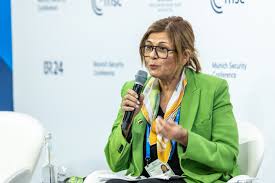Syria’s newly appointed Minister of Social Affairs and Labour, Hind Kabawat, has affirmed that the transitional government was formed on the basis of merit, technical proficiency, and professional qualifications—rather than political patronage or sectarian loyalties. Speaking to Anadolu Agency, Kabawat emphasized, “Each appointed official comes with a legal or technical background in their respective field. This is, in every sense, a government of experts.”
Kabawat, a well-respected legal scholar and the only woman serving in the current cabinet, stressed that Syria has moved beyond sectarian and religious identity politics. “The new Syria will not be built on a sectarian or religious foundation,” she said. “Our next chapter must be rooted in citizenship and national belonging.”
She noted that following her appointment, she received congratulatory messages from religious leaders across the spectrum—Sunni, Christian, Druze, Alawite, Ismaili, Yazidi, and Kurdish—underscoring, in her words, “the rich, pluralistic fabric of Syrian society.”
From Sectarian Identity to Citizenship
Kabawat dismissed the continued political focus on minority status as unproductive, stating, “We are all equal citizens, with equal rights and responsibilities. If we are to build a new Syria, we must speak the language of citizenship—nothing else.”
She also highlighted the competence and resilience of Syrians, both at home and abroad. “Our people have proven their capabilities wherever they’ve gone. There is no doubt they can rebuild their country through determination and hard work,” she asserted. “My ministry is not for any single group—it serves all Syrians.”
Partnership with Civil Society
Kabawat underlined the ministry’s openness to collaboration with civil society and grassroots initiatives. “We welcome innovative ideas and constructive proposals. The government cannot act alone—this must be a collective national effort,” she said. “One hand cannot clap alone; we look to the people to join us in the rebuilding process.”
During the government’s formal inauguration on March 29, Kabawat had already emphasized the importance of building a cohesive and inclusive society as a foundation for social justice. The ministry, she said, will focus on establishing a sustainable and equitable social system, with a particular emphasis on the most vulnerable populations. “Trust between the government and the people is essential. Only through mutual trust can real change begin.”
Public Controversy: Appointment Reignites Child Disappearance Case
Kabawat’s inclusive message has been met with both support and scrutiny. Controversy erupted this week after the appointment of Dalen Bassam Fahd, a former official in the Assad-era Ministry of Social Affairs, to a senior post within the ministry’s Family and Population Division.
Fahd is accused by activists of collaborating with Assad’s intelligence agencies in forcibly removing the identities of children detained with their families and placing them in state-run orphanages—many of them linked to the controversial SOS Children’s Villages network. Online campaigns have since called for her removal and investigation.
The allegations resurfaced amid growing calls for accountability regarding the fate of thousands of disappeared children under the former regime. According to a January 2025 report by the Syrian Network for Human Rights, at least 3,700 children were forcibly disappeared over the past 14 years, many of them taken from their families or born inside detention centres.
In a statement responding to the criticism, Fahd denied direct wrongdoing, claiming she acted under ministerial orders which were in turn dictated by Assad’s feared Air Force Intelligence. She cited the case of Arij and Huda, the daughters of former detainee Ammar Rifai, asserting that they were eventually reunited with their mother before the fall of the regime.
Demands for Accountability
Despite her statement, activists remain unconvinced. “We cannot allow those complicit in crimes against children to serve in a government that claims to represent a new Syria,” one social media campaigner wrote. Critics are urging Minister Kabawat to remove Fahd from office and launch an investigation into her past actions.
Human rights advocates argue that the transitional government must take decisive steps to uncover the fate of missing children, reopen orphanage records, and hold accountable all who facilitated forced disappearances. “The doors of Syrian orphanages must be opened, and we must ask: where are the children of Dr. Rania al-Abbasi and countless others?” one activist wrote.
Shadow of the Past
Further fueling public anger, Majd Jad’an—sister of Manal Jad’an, wife of Assad’s brother Maher—claimed in a televised interview that former First Lady Asma al-Assad played a direct role in placing the children of political prisoners in anonymous orphanages, allegedly for purposes ranging from human trafficking to organ trade. Her accusations, aired on Al Jazeera’s program Above the Authority, have added to growing pressure for a truth and reconciliation process.
As Syria’s transitional government faces the immense task of rebuilding a shattered nation, Kabawat’s ministry will likely be at the center of efforts to restore public trust and confront painful legacies of the past. For many Syrians, justice for the disappeared may be the most urgent and defining test of the new government’s credibility.
This article was translated and edited by The Syrian Observer. The Syrian Observer has not verified the content of this story. Responsibility for the information and views set out in this article lies entirely with the author.


